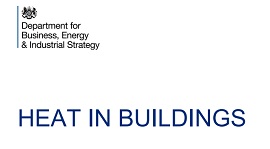The future of heat
In January 2017, BSRIA lent its support to a government consultation seeking input from the construction industry to help develop and support future policies for heat in non-domestic buildings.
The Department for Business, Energy and Industrial Strategy (BEIS) suggests non-domestic buildings in the UK account for 12% of greenhouse gas emissions. Meeting the UK’s 2050 carbon reduction target will require eliminating nearly all emissions from heating buildings and a substantial proportion from heating for industrial processes.
The consultation is open until: Friday 27th January 2017 and can be seen here.
The consultation considers:
- Keeping energy bills as low as possible.
- Continuing to ensure the nation has a secure and resilient system.
- Remaining at the leading edge of science, research and innovation.
- Reducing carbon emissions cost-effectively.
Alongside this call for evidence, BEIS is publishing the Building Energy Efficiency Survey (BEES) (building energy efficiency survey) research.
BEES provides detail on energy use and abatement potential to reduce energy and carbon emissions, as well as barriers and enablers across the whole non-domestic building stock.
Peter Tse, BSRIA Principal Design Consultant, said:
“We urge BSRIA members and industry alike to complete this survey. This consultation provides the opportunity for the building industry to provide the context to support development of a long term policy strategy to deliver the most effective savings.”
Early in 2016, BSRIA was commissioned by the former Department of Energy & Climate Change (DECC) to provide them with a better understanding of current knowledge and gaps in knowledge in relation to low-carbon heating and cooling systems in the non-domestic sector.
This work identified industry experiences, drivers and challenges associated with low-carbon technologies, the industry view on current relevant policies and standards and recommendations to support the policy making process.
It was supplemented by a jointly-hosted event by BSRIA and BEIS to discuss the standards and performance of heating systems in non-domestic buildings and what roles government and industry should take to overcome the challenges to the uptake of low-carbon technologies and measures.
This article was originally published here by BSRIA in Jan 2017.
--BSRIA
[edit] Related articles on Designing Buildings
- BSRIA articles on Designing Buildings Wiki.
- Global challenges and opportunities in heating markets in 2020.
- Heat meter.
- Heat metering.
- Heat pumps and heat waves: How overheating complicates ending gas in the UK.
- Heat transfer.
- Latent heat.
- Sensible heat.
- Specific heat capacity.
- The future of the HVAC and building controls industry.
- Thermal comfort.
- Thermostat.
Featured articles and news
A case study and a warning to would-be developers
Creating four dwellings... after half a century of doing this job, why, oh why, is it so difficult?
Reform of the fire engineering profession
Fire Engineers Advisory Panel: Authoritative Statement, reactions and next steps.
Restoration and renewal of the Palace of Westminster
A complex project of cultural significance from full decant to EMI, opportunities and a potential a way forward.
Apprenticeships and the responsibility we share
Perspectives from the CIOB President as National Apprentice Week comes to a close.
The first line of defence against rain, wind and snow.
Building Safety recap January, 2026
What we missed at the end of last year, and at the start of this...
National Apprenticeship Week 2026, 9-15 Feb
Shining a light on the positive impacts for businesses, their apprentices and the wider economy alike.
Applications and benefits of acoustic flooring
From commercial to retail.
From solid to sprung and ribbed to raised.
Strengthening industry collaboration in Hong Kong
Hong Kong Institute of Construction and The Chartered Institute of Building sign Memorandum of Understanding.
A detailed description from the experts at Cornish Lime.
IHBC planning for growth with corporate plan development
Grow with the Institute by volunteering and CP25 consultation.
Connecting ambition and action for designers and specifiers.
Electrical skills gap deepens as apprenticeship starts fall despite surging demand says ECA.
Built environment bodies deepen joint action on EDI
B.E.Inclusive initiative agree next phase of joint equity, diversity and inclusion (EDI) action plan.
Recognising culture as key to sustainable economic growth
Creative UK Provocation paper: Culture as Growth Infrastructure.























